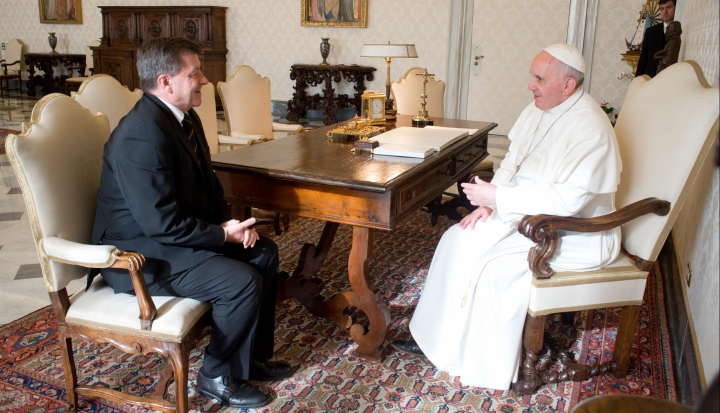As has been evident since Pope Francis’ election, his vision for the role of the church in public utterly does not fit the contours of politics in the United States. Its bends and angles completely cross over the trenches of our polarization. The conservative red and liberal blue lenses through which public life is usually appraised in the United States are no help with Pope Francis.
Austen Ivereigh’s book The Great Reformer: Francis and the Making of a Radical Pope, remedies this. It’s the best biography of Jorge Bergolio out there, a wonderful read that draws one quickly into the mind and heart of the future Pope Francis. I recommend it to anyone interested in understanding this papacy. Among many other biographical insights, it offers a glimpse into what informs the pope’s challenging vision for the role of the church in public life.
That the book does not reduce the complexity of the pope’s intellectual formation to a single narrative is testament to its richness and fairness. The immigrant experience of his parents and grandparents, the personal impact of teachers and mentors, St. Ignatius’ spiritual exercises, the theologies of Yves Congar and Henri de Lubac, the rise and fall of Peron, the trials of his time as Jesuit provincial, his profound appreciation of literature, his delight in popular devotions, and much, much more are deftly surveyed by Ivereigh for their importance in the formation of the future pontiff.
Many of these influences also point toward the role of the church for contemporary public life. For example, three influences identified in Ivereigh’s book illustrate how hard it might be for audiences in the United States to understand the pope’s worldview: the Catholic Action movement, the Guaranis and the Jesuits, and Argentine pro-market anti-clericalism.
Catholic Action
The Catholic Action movement from the late 19th century through to the present has, in some countries, sought to mobilize Catholics, especially working-class Catholics, for civic and political engagement to advance the church’s moral and social teachings in society and government. Relatively unknown in the United States, but historically influential in countries like Italy, Spain, Poland, France, and even the Philippines and Australia, Catholic Action found much support in Latin America, including Argentina. Traditionally, the movement’s agenda has been social justice policies; it has opposed both Marxists and fascists and in many places allied itself closely with organized labor.
Ivereigh credits Jorge Bergoglio’s grandmother, Rosa, as being a very important influence on the pontiff. She was a prominent activist with Catholic Action in Italy, working in opposition to Mussolini and the Fascists. In his youth in Buenos Aires, the future pope worked actively with Catholic Action as well.
With its focus on mobilizing the working class in support of the church’s social teachings, Catholic Action might mistakenly be confused with U.S. style progressivism. But, where progressives align with secularism and with liberal or even libertarian social values, Catholic Action strongly emphasizes deep religiosity and traditional social values and mores. The famous Cursillo movement of spiritual transformation emerged out of the Catholic Action movement in Spain.
The Guaranis and the Jesuits
The Guaranis are the largest indigenous group in the Argentine region. In colonial times they faced pressure from Portuguese and Spanish settlers across a broad geographical swath from southern Brazil through to Argentina. Settlers—especially the landholding elites—sought to displace the Guaranis from their lands and to enslave them for labor, with the strong support of their governments in Portugal and Spain.
Against the Spanish and Portuguese governments and the rising power of the colonial landed class, the Jesuits intervened in support of the Guaranis. As is true in every historical instance of colonization, the Jesuit efforts were not without elements of exploitation, but they did labor to protect the Guaranis from slavery and protect Guarani lands from confiscation. Jesuits were known to promote Guarani militias and, in some well-known examples, give their own lives to protecting the indigenous people.
The Jesuits worked with the Guaranis by organizing them into communities called “reductions”: some leadership remained with the tribes, but the Jesuits maintained an active governing role. Jesuits also worked to educate the Guaranis and to develop trade and industry. Evangelization was, of course, at the heart of the work, but unlike forced conversions elsewhere in colonial history the Jesuit reductions arguably were more open and respectful of indigenous values and culture. Ultimately, in part because their opposition to the colonial powers’ policy toward indigenous peoples, the Spanish and Portuguese governments expelled the Jesuits in the mid-18th century from their lands and colonies.
The key narrative here is that of Jesuits resisting the global powers, respecting the values and culture of the indigenous peoples, and striving to protect them from enslavement. According to Ivereigh, Pope Francis takes particular inspiration from the history of the Jesuits’ role in colonial Argentina.
Argentine Pro-Market Anti-Clericalism
In U.S. history, enthusiasm for free market economics often marches shoulder to shoulder with religious enthusiasm. Prosperity Gospel religiosity has deep roots in our nation’s collective psyche, which classical sociologists like Max Weber have traced to our Puritan forebears. In the politics of recent decades our association between religion and the free market has even sharpened. As Ivereigh’s book makes clear, Argentine history has been very different.
For much of Argentine history (as is the case for other nations around the world), advocates of free market economics sought to constrain the role of religion in society and public life. From a theoretical economic perspective, religions might be understood, both as organizations and as systems of values, to interfere with the free, self-interested competition that is the engine of markets. Along these lines, in Argentina free market advocacy aligned with European-style anti-clericalism. Advocates of this policy argued that Argentina needed to sweep away the superstitions and traditions and hierarchies of Catholicism—in order to free up the possibilities for competition-driven progress.
Politically, and often with support from foreign businesses, pro-market interests in Argentina co-opted the military to repress popular movements and working class organizations such as labor unions. The dictatorships that reared up were alliances of capitalists and caudillos. Such dictators defined themselves as economic progressives, but at the same time were anti-clerical and repressed the interests of the lower classes. As Ivereigh’s excellent book details, in this history the Catholic Church found itself naturally allied with the lower classes, supporting democracy against dictatorship, focused on social justice, and in opposition to pro-market advocates allied with the military. Ivereigh explains that this is a history Pope Francis knows well.
These three topics—Catholic Action, the Guarani, and Argentine anti-clericalism—are just snippets from Ivereigh’s rich book. They are examples of how valuable the book can be for understanding this extraordinary papacy within the worldview of the church in the United States. As I said at the outset, I highly recommend The Great Reformer.
Now another important matter…
Last week I criticized Professor Robert P. George and what I took to be his argument for a diminished role for the church in advocating for social justice. I have learned that my criticism was wrong and I apologize to him and to my readers.
Professor George and I still differ about what we believe to be the proper role for bishops and clergy in public life, but we both insist that the mission of the church in public life is to advocate strongly for laws and policies that promote all of the church’s moral and social teachings, and not just those teachings that pertain to matters of intrinsic evil or what some call non-negotiable moral issues.
Stephen Schneck's blog, Church and state, will update every Monday. Follow him on Twitter @StephenSchneck.
Image: International Labour Organization Director-General Guy Ryder meets with Pope Francis to discuss the dignity of workers. Flickr cc via International Labour Organization










